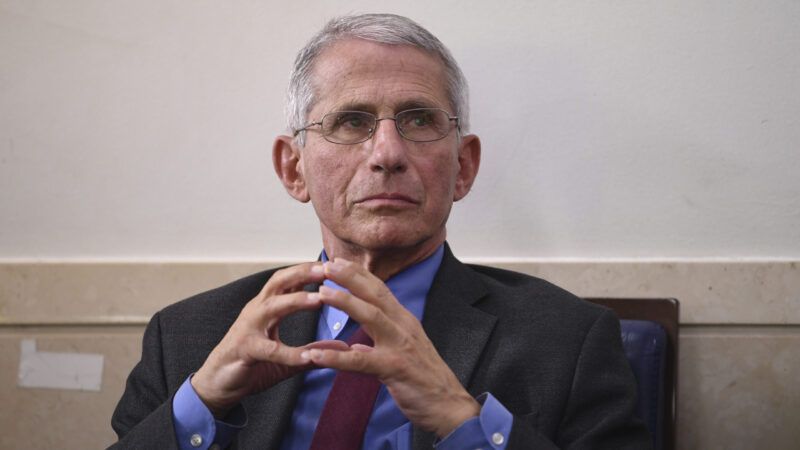Fauci Says CDC Mandates 'Should Not Be a Court Issue'
That's a fundamentally anti-democratic attitude.

Anthony Fauci is "surprised and disappointed" with this week's federal court ruling that overturned the mask mandate on planes, trains, and public transportation.
That's not because the president's chief medical advisor disagrees with the substance of Judge Kathryn Kimball Mizelle's ruling. No: Fauci thinks the problem is that the courts have any power over public health edicts at all.
"Those types of things really are the purview of the [Centers for Disease Control]. This is a public health issue," Fauci told CNN's Kasie Hunt on Thursday. "We are concerned about that—about courts getting involved in things that are unequivocally public health decisions. I mean, this is a CDC issue; it should not be a court issue."
Considering how much of his life he has spent working within or alongside the federal government, Fauci's belief that the CDC ought to exist outside of the constitutional limitations applied to government actions is stunning. This is either a complete misunderstanding of the American system's basic functions or an expression of disdain toward the rule of law.
Fauci says the CDC had a "perfectly logical" plan to review the mask mandate in early May, as it intended to do prior to this week's ruling.
"For a court to come in and interfere in that is really unfortunate. It's unfortunate because it's against public health principles," he told Hunt, adding that "that's no place for the courts to do that. This is a CDC decision."
Here's the thing: Even if a mandate is a good idea, that doesn't mean it falls within the legal authority of the agency that imposed it. That's exactly why a co-equal branch of government is tasked with determining whether the actions of the other two branches are legal.
Or, as Mizelle put it in Tuesday's ruling: "Our system does not permit agencies to act unlawfully even in pursuit of desirable ends."
The COVID-19 pandemic has taught us that many public health officials don't seem to recognize the limits of their powers or the importance of the rule of law. Fauci has previously criticized other foundational aspects of the American system, such as the state officials' ability to set their own rules regardless of what the federal government might say. That's just another way of expressing the perspective Fauci shared with CNN this week: that the CDC's edicts ought to be absolute.
This sentiment extends far beyond Fauci. As I wrote in a February feature for Reason: "In state after state, public health officials have lined up to defend arbitrary and aggressive pandemic rulemaking against the constraints of the democratic process. In doing so, they've defended both Democratic and Republican administrations, showing a bias toward unilateral power rather than any particular political party."
It's not just public health officials who have held this view. "Public health decisions shouldn't be made by the courts," White House Press Secretary Jen Psaki told reporters this week. "They should be made by public health experts." Legal commentators such as Slate's Mark Joseph Stern have similarly collapsed the distinction between what may be sensible and what may be legal.
If the CDC or state public health agencies require the legal authority to mandate masks and other pandemic-related behaviors, they should ask Congress and state lawmakers to explicitly grant those powers via legislation. It's been two years! There's been plenty of time for that to happen.
But there was never a serious attempt to do such a thing. The CDC merely claimed powers it never had, and then its defenders whined about the inevitable backlash against that overreach. The same process played out with the CDC's unlawful order banning evictions and the Biden administration's ill-fated attempt to have the Occupational Safety and Health Administration (OSHA) impose a vaccine mandate on private businesses. And the outcome is the same.
(Also, let's be clear about the effectiveness of the mask mandate in the first place. I've observed widespread noncompliance on public transit in Washington, D.C.—a city where it is not uncommon to see people masked while walking alone outdoors on a sunny day in April 2022. And as anyone who has recently taken a flight can tell you, masking was hardly universal on commercial flights even before the mandate was struck down this week.)
Not getting your way in court is not grounds for discarding the very concept of the rule of law. Neither, for that matter, is a once-in-a-generation pandemic.


Show Comments (266)